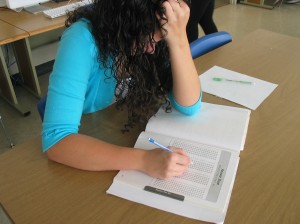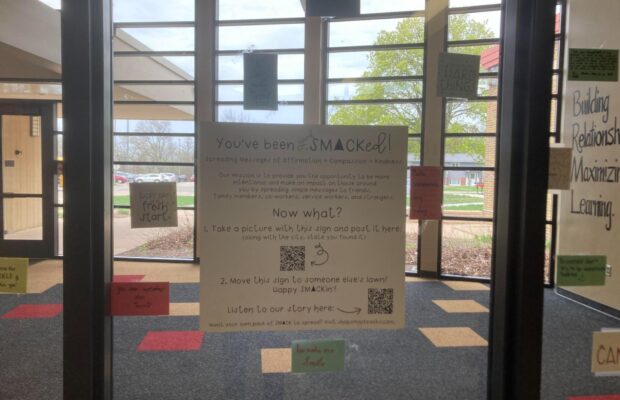Acing the ACT: Students offer tips for success on high-stakes standardized test
Keep calm and circle “C”.
On Apr. 14, students across the country will report to designated centers, pencils sharpened and erasers poised, to take the seminal American College Testing (ACTs). The ACTS came to fruition as an attempt to rival the C ollege Board’s Scholastic Aptitude Test (SAT). Broken into four sections, the ACT tests aptitude and likelihood of collegiate success through assessments in English, math, reading and science, offering an optional writing test for an additional fee. Each section receives a score from one through 36, and each individual score contributes to a formulated average composite.
ollege Board’s Scholastic Aptitude Test (SAT). Broken into four sections, the ACT tests aptitude and likelihood of collegiate success through assessments in English, math, reading and science, offering an optional writing test for an additional fee. Each section receives a score from one through 36, and each individual score contributes to a formulated average composite.
 ollege Board’s Scholastic Aptitude Test (SAT). Broken into four sections, the ACT tests aptitude and likelihood of collegiate success through assessments in English, math, reading and science, offering an optional writing test for an additional fee. Each section receives a score from one through 36, and each individual score contributes to a formulated average composite.
ollege Board’s Scholastic Aptitude Test (SAT). Broken into four sections, the ACT tests aptitude and likelihood of collegiate success through assessments in English, math, reading and science, offering an optional writing test for an additional fee. Each section receives a score from one through 36, and each individual score contributes to a formulated average composite.
Offered five or six times throughout the school year, a host of students will sit down and have their basic skills tested for the first time this upcoming Saturday. Many others, however, have chosen to forgo the April testing option and will be assessed after the final school bell has rung this semester. With the June test date lurking right around the calendar, first-time test-taker Josh Carlo, a junior, decided to get a leg up in the preparation process and took advantage of CF’s own prep classes.
As per years past, the high school offers prep classes chunked into four two-hour sessions that delve into the know-how of the standardized event. Teachers from the core test areas explain the logistics of each test section — number of questions, amount of time, other specificities — and debrief students on material they’ll most likely encounter on the ACTs. A past test is then administered under actual time constraints; once completed, students can check their scores to receive immediate feedback and seek additional help with fuzzy concepts. Along the way, teachers divulge various tips and tricks to test taking that may help in unexpected ways. Commented Carlo, “apparently, chewing something or having peppermint during standardized testing improves scores by an average of 10 percent. Who knows if it actually works, but I’d say it’s worth a shot.”
Even if this minty advice falls stale, Carlo and all other test takers have the option to retake the tests should they so choose. Senior Beth Kosmicki was one such student, opting to try her hand at the procedure a total of three times. Observing her older brother’s experience with the test, she embarked on her first ACT challenge during sophomore year so that her current geometry lessons in school would stay fresh in mind during the math portion. Testing first as a sophomore gave Kosmicki actual practice and plenty of leeway to retest should she feel so inclined.
And retest she did. After receiving her first scores, Kosmicki’s intrinsic drive to reach her full potential led her to retake the test not once but twice, not stopping until her personal benchmark had been reached. “Each time I retook the test, I did better. I think it was because I became more familiar and less anxious with the testing process, and I learned more in school, which I could apply,” she said.
Though it proved beneficial for the ambitious senior, Kosmicki said she believes retesting applies on a person-to-person basis. “If you are satisfied with your first score, then don’t retest, but if you believe you can do better, then do it. Ultimately, you need to do what will make you happy. When you know that you have tried your hardest, in my opinion, that’s all that really matters.”
Content with his first crack at the ACTs, senior Jesse Streicher ended up retesting in order to tack on a writing score. He received said score and then some, becoming one of only 705 students out of over 1.6 million to score a perfect 36 Composite score in 2011. Crediting the benefits of paying attention in class, Streicher urges future test takers to play it cool and trust their teachers’ preparation when it comes time to fill in the circles. “Getting nervous will hurt you. You should have a healthy amount of nerves, but freaking out will get you in the end.”









You must be logged in to post a comment Login